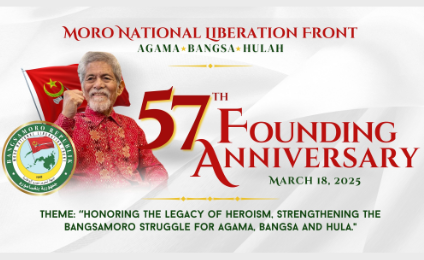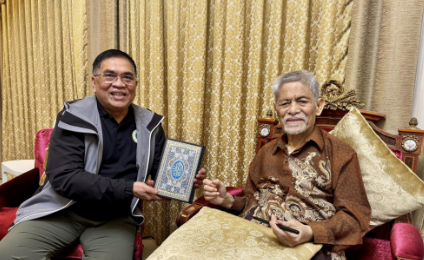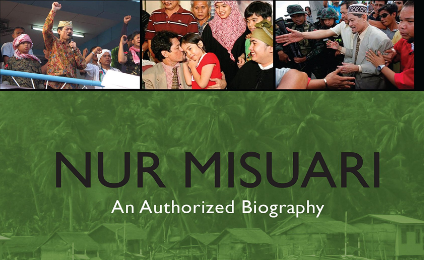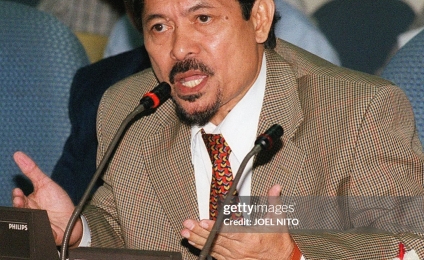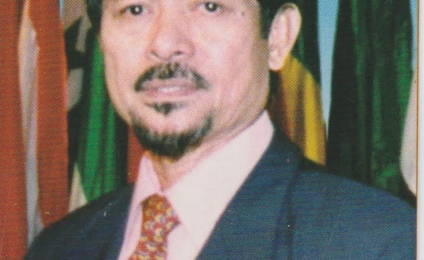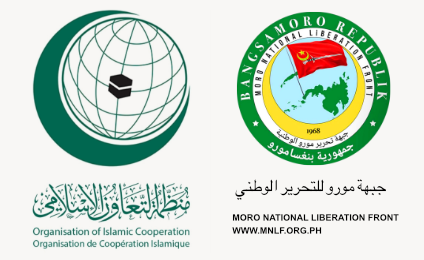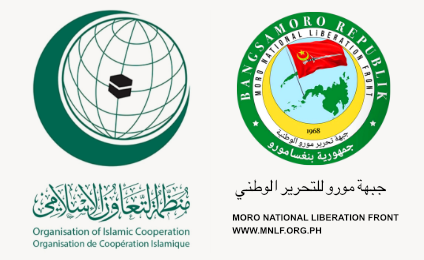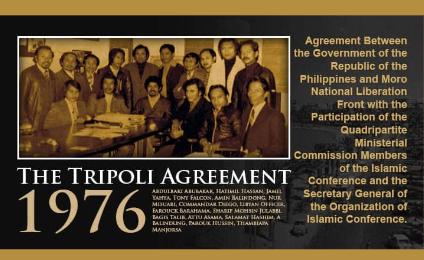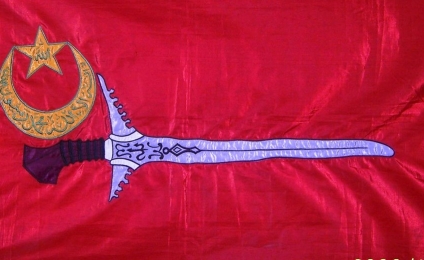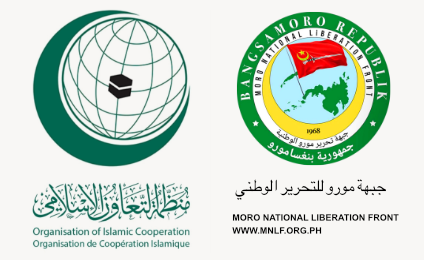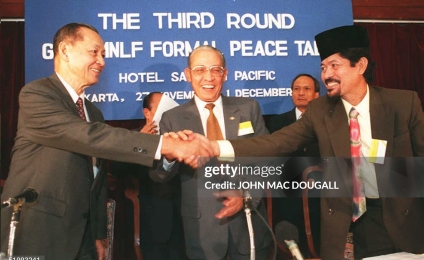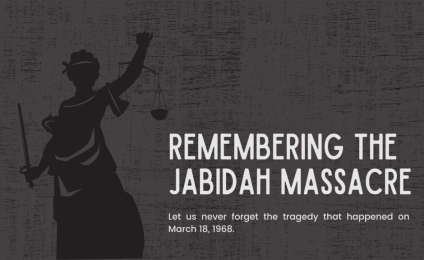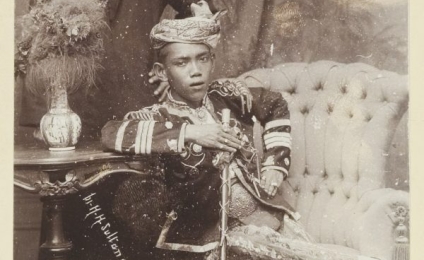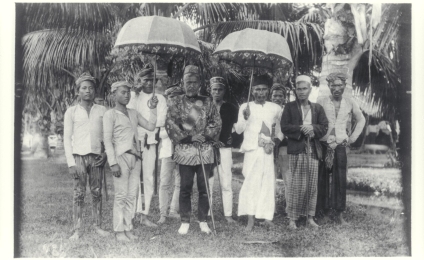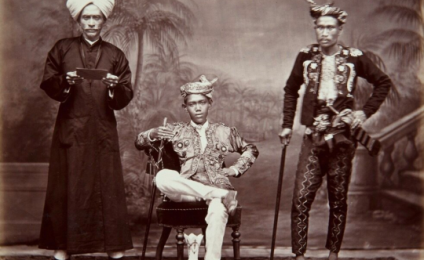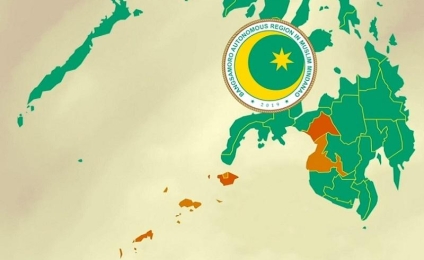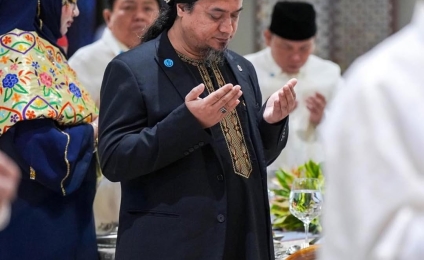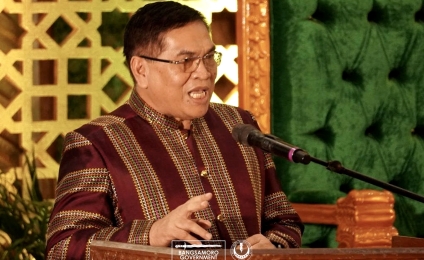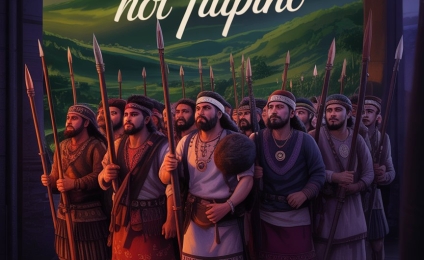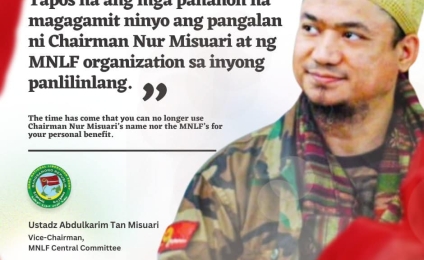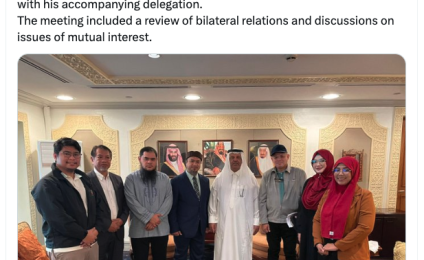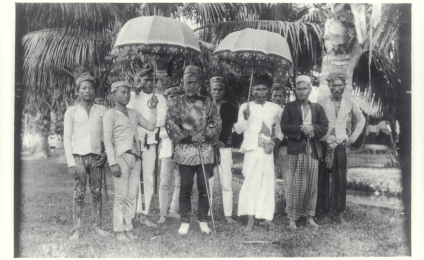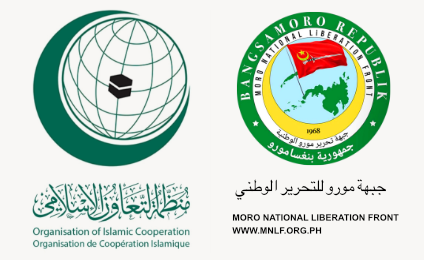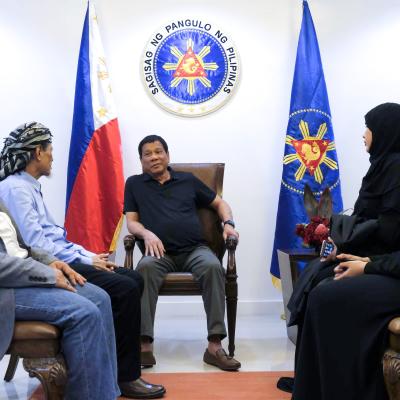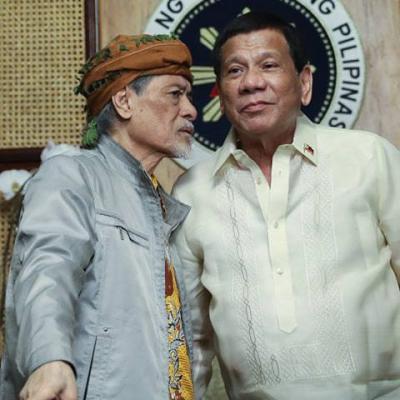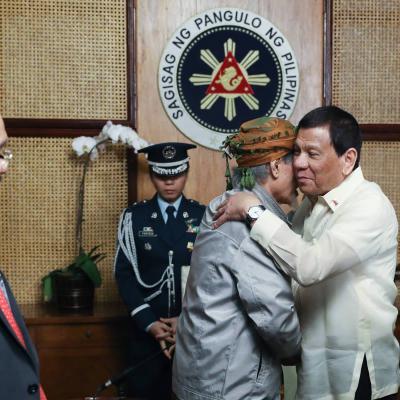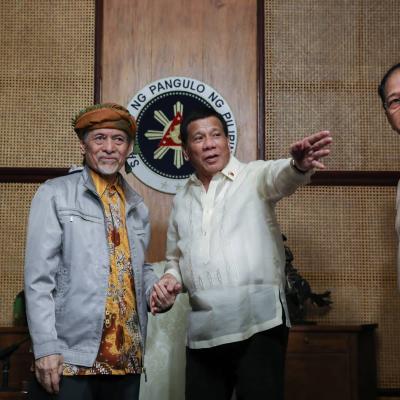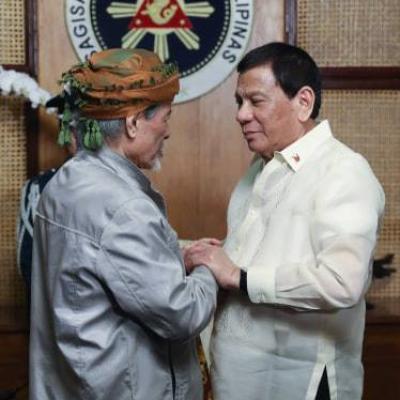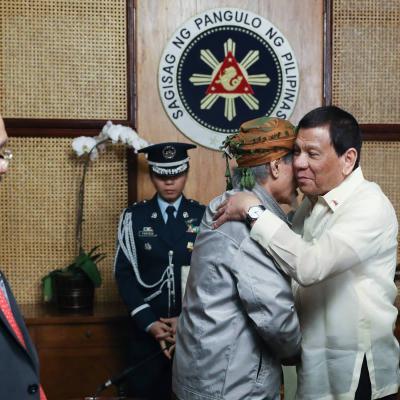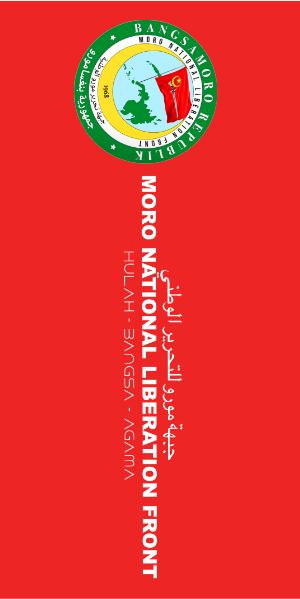Your Highness
Sheikh Hamad Bin Khalifa Al-Thani
Emir of the State of Qatar
President of the Ninth Islamic Summit Conference
Your Excellency
Syed Mohammad Khatami
President of the Islamic Republic of Iran &
Out-Going President of the Eight Islamic Summit Conference
Your Excellency
Dr. Ezziddine Laraki
OIC Secretary General
Your Excellency
Dr. Abdulwahid Belgaziz
In-Coming OIC Secretary General
Your Majesties
Your Highnesses
Your Excellencies
Distinguished Guests and Esteemed Brothers &
Sisters of the 56 Brotherly Delegations
Assalamu Alaikum W’Rahmatullahi W’Barakatuhu!
Alhamdulillah! All Praises and thanks be to the Merciful and Compassionate and All-Powerful Allah for His Infinite and Inscrutable Wisdom in causing the timely convening of this Islamic Summit Conference of the fifty-six (56) sovereign heads of Islamic States from across the continents of the world at this very juncture in the history of the Islamic Ummah.
From what have transpired so far, this Islamic Summit Conference is bound to go down in history as one of its most successful sessions. As we could see, it is expected to produce magnificent result to accelerate the re-emergence of the Islamic Ummah as a key player in world affairs and in presiding over the destiny of mankind. And this includes the kernel of all contemporary Islamic issues, which is the fate of Palestine and Al-Quds Al-Sharif and the Glorious Intifada.
It is in this light that I take immense pleasure in associating the MNLF 13-man delegation and the entire 17 million Bangsamoro people of Mindanao and its islands in welcoming with all sincerity the holding of this Islamic Summit Conference in this beautiful and hospitable City of Doha, the Capital of the State of Qatar. And we thank most profoundly His Highness Sheikh Hamad bin Khalifa Al-Thani and the generous people of the State of Qatar for their warm brotherly welcome accorded to our delegation.
It is also in this light that I join the 56 Sovereign Heads of Islamic States in congratulating His Highness, Sheikh Hamad Bin Khalifa Al-Thani, the Emir of the State of Qatar, in his assumption to the Presidency of this 9th Islamic Summit Conference; and, too to assure His Highness of our ardent prayers and our moral support behind his 3-year long stewardship of the destiny of the Islamic Ummah.
I’m sure His Highness needs our individual and collective support and encouragement, however far removed we are from the mainstream of the Islamic World, because he has to brace himself against the pressing challenges and dilemma that will come his way. Many parts of the Islamic Ummah are convulsing. Palestine is bleeding and is going to be on top of His Highness’ preoccupation. Certainly, his burden will be lightened should this Islamic Summit and the OIC as a whole be able to rekindle the flame and the indomitable spirit of Islamic Unity and solidarity and brotherhood. The more so should we be able to ward off the spectre of apathy complacency and uproot the issues of divisiveness in our midst.
In the eyes of the world, the Islamic Summit and the OIC as a whole are looming very large in the horizon as the repository of the conscience and the power of the Islamic Ummah, that represent 1.5 billion or roughly one-fourth of the population of this planet Earth. And, too, it counts from among its fraternal member-states some countries entrusted by the Almighty Allah with the lifeblood of modern industries, which are the foundation and the vital ingredients of power and influence in the world. And we should not forget either that a growing number among them have already succeeded in taming the mystery of science and advanced technology and are in the process of harnessing their awesome power for powerful endeavor as well as for their national security and defense.
Moreover, they are in occupation of the major arteries of world trade and commerce. And their economic potential is definitely among the greatest. Allahu Taa’la has been so gracious and so kind to the Ummah. Only we still have to learn how to optimize the utilization of these power and potential for the benefit of the Islamic Ummah and the oppressed humanity, particularly its downtrodden members, the non-self-governing ones.
Despite the exigency of our contemporary life, the Islamic Summit and the OIC leadership as a whole have been extremely cautious and circumspect, indeed. In some instances, they have wavered and refused to shoulder their responsibility to muster and harness all the power and influence that Allah has placed in their hands for our common benefits. So we remain the oarsmen of this contemporary world and civilization, helplessly taunted and flaunted and intimidated by everyone, including the dregs of Earth!
It is not, of course, difficult to grasp and understand how the Islamic Ummah can free itself from its internal malaise, in order to regain the respect of the world, including those so-called Super Powers, should it succeed to consolidate and optimize the utilization of the vast power and influence the Almighty Allah has placed at its command. And the first major step in this direction is how to consolidate all its integral parts, because number is one of the essential elements of the chemistry of power. Without sounding self-serving, this should include all of us, the 400-million downtrodden elements of the Islamic Ummah---the non-self governing Islamic nations and communities hitherto under the rule and domination of non-Islamic governments. For we it is who need most urgently a powerful and respectable and caring Ummah, perchance we can turn to it for shelter and protection and assistance from the vagaries of our volatile and perilous world where we live in. Indeed, it is we who need a genuinely concerned Ummah capable of extending a helping hand to all of us---we who are still facing such a terrible dilemma. For we do not know for sure what fate might befall on us and our people again. Yes, we do not know what is in store for us and our hapless and innocent children when they take over where we leave off.
We would like to point out that while other Islamic and non-Islamic nations or countries have already freed themselves from the bondage of colonial rule, whether in Asia or Africa or elsewhere, others, like the Bangsamoro people, who are supposed to be one of the strongest and most legitimate candidates for decolonization and independence, still remain in the lurch - - - unable even to achieve the barest autonomy for themselves and their posterity.
Why is this so? We regret to say that there has been a sort of double standard even in the previous act of this Organization. While the OIC supported with alacrity the heroic struggle of our African and Asian brothers to enable them to avail of the pertinent provisions of the OIC Charter as well as those of the UN Charter and the UN General Assembly Resolution on self-determination, decolonization and independence, this same OIC support was not made available in the case of the Bangsamoro struggle.
While we are eternally grateful to the OIC and its member states for their brotherly concern and support, yet this is one vital link in the chain that is amiss --- the OIC recognition and support behind the Bangsamoro fundamental rights to self-determination, decolonization and independence. While you have re-affirmed your recognition and support behind fundamental rights of our people in the earlier ICFM resolution, lately no mention of this matter has been done at all. It was as if it was dropped in the cold by inadvertence. And yet this is one bounteous source of leverage in our pursuit of peace, justice and freedom. Something that our people bear in their soul as it were a birthmark – because it is an essential attribute of their sovereignty as a people, which is at once immutable, imprescriptible and inalienable.
If you happen to look at the world map, easily your eyes will rivet on a cluster of hundreds or even thousands of islands and islets, altogether a sum total of 130,000 square kilometers of land, endowed with rich Islamic culture and a proud history of over four centuries of struggle against foreign aggressors; favored with excellent climate throughout the year, with lush rain forest everywhere despite the criminal activities of some Filipino settlers who came to enrich themselves at the expense of our forest and ecology and our people.
These group of islands, islets and reefs are impeccably arranged by nature, such that it is easily distinguishable from its Southeast Asian neighbors, because it is tightly bounded and sharply set off from them and from the rest of the world by four major bodies of water. From the northern approach, the Bangsamoro Homeland is bounded by the Mindanao Sea that we share with the Visayas and Luzon in the north; from the south by the Celebes Sea, that we share with brotherly Indonesia; from the east, by the Pacific Ocean, that we share with the Pacific basin countries; and from the west, by the South China Sea where lies the highly contentious and volatile Spratly Islands, the traditional fishing grounds of the Bangsamoro people for centuries and the sensitive bone of political contentions among the powers in the region, including the Philippine Government as of the present moment.
Enclosed by this ring of islands and islets and buttressed from all sides by these vast bodies of water is the Sulu Sea, named after the Sultanate of Sulu, founded by a learned Arab missionary who rode on the crest of world trade and commerce in the late 13th century. His name was Sharif Abubakar Al-Hasimi, may the Almighty Allah be eternally indebted to him and pleased with his soul. He was buried with hi son, named Sharif Kamaluddin, in the most prestigious and beautiful mountain in Sulu—called Bud Tumantangis.
It will be recalled that in 1417, one of the Kings of Sulu died in a Chinese territory and a beautiful mausoleum was erected in his honour with an epitaph from the handwriting of the reigning Chinese Emperor himself, which says: “He was a Brave King and He was the Master of the East!” That was the impression of the Chinese people and Government at a time when China thought that it was the “Center of the Universe”. Perhaps, it was not China alone that held the Sulu Sultanate in such high esteem; the rest of its neighbors and even some distance places in the world apparently also held similar impression of this Bangsamoro government in those days. Indeed, its diplomatic dealing and exchanges with the Ottoman Empire and the British Empire and the Spanish Empire in the later centuries could vouchsafe this historical truism. Incidentally, to get a glimpse at the stature of the Sulu Sultan, it was said in the chronicler of this state visit of so eminent a world personality that the Sulu Sultan or King had travelled to China at the head of a royal entourage of over three hundred members of the Royal Family and the Ruma Bitchara (equivalent to modern-day law-making institution), and some distinguished leaders from various parts of the Kingdom.
Apart from the fertility of the soil, beneath the Bangsamoro Homeland is a vast and inexhaustible quantity of precious mines and mineral and other natural resources. Nickel is either the biggest or second biggest deposit in the world; initial natural gas find is invariably estimated at between 2.5 and 7.5 trillion cubic feet. In fact, the Philippine authority has already committed the first 2.5 trillion cubic feet to a consortium for a paltry sum of US$5 billion only. I was a silent spectator during the signing ceremony. This is a flagrant violation of the Peace Agreement and an affront to the integrity of the Bangsamoro people. It was said that 2.5 trillion cubic feet of natural gas could produce nearly 3,000 megawatts of electricity, enough to illuminate the entire Luzon Island and its metropolis for twenty years.
Likewise, oil has been found in several places. One newspaper and TV program claimed recently that an American exploration or prospecting team has struck 2 billion barrels of oil in the Sulu Sea facing the State of Sabah. Satellite imagery shows that the Sulu Sea could probably be the center of the oil basin in Southeast Asia. We should not forget that the Sulu or the Bangsamoro Homeland of Mindanao and its islands are within a cockcrow’s distance to center of oil and gas in neighboring Kalimantan, Sabah, Sarawak and Brunei Darussalam. It does not stand to reason that the Bangsamoro Homeland is without these precious resources, too.
Add to this the vast sources of wealth such as the inexhaustible aquatic resources. The Sulu Sea and our parts of the South China Sea, the Pacific Ocean and the Celebes Sea are known far and wide as among the riches habitat of fish in the world. Indeed, lately, the island of Sulu and Tawi-Tawi alone have gained the reputation as among the biggest suppliers of seaweed’s, technically called “carregenans”, to the world market. It is one of the fastest growing commodities in demand in demand today because it has many derivatives that can be used for food, medicine, and so on and so forth. Indeed, our potentially is so vast and enormous that we will never, Insha Allah, become a liability to the Islamic Ummah and the rest of the world should we get the freedom to tap these resources for our own people’s use.
But ironically, it is in this land, the ancestral Homeland of the 17-million Bangsamoro people, the native indigenous inhabitants of Mindanao and its islands, where one can find, as the recent OIC Special Fact-Finding Mission might have found, among the poorest and most illiterate sectors of the Philippine population, because they have received relatively the least attention from the national government, partly owing to persistent suspicion and anti-Muslim biases and discrimination. Since the annexation of our national Homeland by the Philippine Government in July 1946, on the occasion of its independence from the American colonial government, the national government in Manila has been focusing its attention and spending its financial and other resources mostly in Metro Manila and other parts of Luzon and the Visayas – to the detriment of far-flung areas like Mindanao. Mindanao and its islands are more than six or seven hundred nautical miles away from Manila.
Moreover, no sooner our people and Homeland were annexed and gobbled up by the Philippine Government, as part of an international collusion and conspiracy, the land, the wealth and the political power were steadily transferred to the hands of the newly arrived Filipino Christian settlers in Mindanao. Some of these neo-colonial rulers in our Homeland have become so chauvinistic and arrogant that they look down on us and our people as if we are denizens from the land beyond beyond. And in order to protect their unlawful gains in our Homeland, they did everything in their power and influence to obstruct and derail the GRP-OIC-MNLF Peace Agreements. If we are in such a predicament in Mindanao and its islands till now, it is probably because the implementation of the Peace Agreements have not taken off properly, largely because of the machination and subterfuge of those people who happened to among the most powerful and influential members of the Ruling Party of H.E. President Joseph E. Estrada.
Indeed, even during the previous administration, the one that negotiated and signed the latest Peace Agreement with us and the OIC, it was they, the opposition, who had filed a lawsuit before the Philippine Supreme Court for the annulment and abrogation of the Peace Agreement.
We were, incidentally, told by spokesmen of the previous government that it was mainly for this reason that they had to bow to the mounting pressures to marginalize the Southern Philippines Council For Peace and Development (SPCPD), thereby making it literally useless and inutile to all intent and purposes. Thus they refused to undertake the outright devolution and transfer of the other major implementing arms of the Peace Agreements, such as the Office of Muslim Affairs (OMA), the Southern Philippines Development Authority (SPDA), the National Council of Indigenous People (NCIP), which is the umbrella office of the eight million indigenous Highlander Bangsamoro people; The Basilan Task Force, and other offices which could have been quite useful in enabling us to implement our binding and international commitment and obligations prescribed by the Peace Agreements. Their simplistic explanation to rationalize their action is that, to quote one Malacanang spokesman. “We must not,” he said, “play into the hands of the opposition!”
As a matter of fact, even in the present anti-MILF military offensives in Mindanao, these powerful and influential Christian leaders were the staunchest advocates and supporters from the very start. And they never hide their fanaticism and aggressiveness in calling for blood!
Now they are in the Ruling Party and are in command of vast power and influence in both Houses of the Philippine Congress and in the local and city governments in Mindanao. Thus, they are able to create more obstruction and difficulties for us and the Peace Agreements than we are capable of facing.
In fine, they do everything to oppose and cause the derailment and failure of the Peace Agreements in order to prevent the rise of the Bangsamoro people and leave the playing field completely and continually under their control and hegemony. In other words, they want to continue to monopolize the power and authority and influence in the Bangsamoro Homeland, politically, economically, and culturally, in order to be able to orchestrate and direct the fate and destiny of the Bangsamoro people and their ancestral Homeland.
Thus the sequence of failure of our Peace Agreements. Firstly, the Tripoli Agreement of 1976; followed by the failure of the Jeddah Accord of 1987, and, lately, the failure also of the so-called “Manila Final Peace Agreement”. Mainly because of their staunch opposition, the three-year transitional mechanism has failed; and so too, it’s one-year extension. And we believe quite strongly, that the present extension is also bound to fail, considering the terrible and calamitous political crisis that grips the Philippine Government and society today. Everyone is a witness, through the CNN, BBC, and MBC, and others, the unfolding of the political spectacle in Metro Manila, which is capped by presidential impeachment proceedings. Unless the bone of contention is resolved speedily, the crisis might drag on indefinitely, thereby continually sapping the economic and financial capability of the government to pursue its great tasks.
In the end, this might ultimately affect the capability of the Philippine Government to address our problem and cause the repetition of its failure to comply with its “binding international commitments and obligations” under the terms of the GRP-OIC-MNLF Peace Agreements. Consequently, this might contribute towards the prolongation of the anguish and misery of the Bangsamoro people. Undoubtedly, because of the government financial difficulties, it might be even much more difficult to fund the rehabilitation and reconstruction programme and other socio-economic components of the Peace Agreements.
Nevertheless, we would like to acknowledge our gratitude to the Ramos Adminsitration, that signed the latest Peace Agreement with us, for giving some funding for a number of small roads in Tawi-Tawi, Maguindanao, Lanao del Sur and, more importantly, the 162 kms. Circumferential Road in the island of Jolo, Sulu. Although in this latter case, the funding available is barely one-third of the legal requirement needed to pave a 2-lane 162 km. road. This is in accordance with the existing law. Likewise, we are grateful to H.E. President Joseph E. Estrada for giving our people 163 steel bridges worth P4.3 billion pesos, which the British Government has generously made available in the form of soft loans. The Philippine Government has put up a counterpart money worth over half a billion pesos for a purpose. This is indeed a very valuable legacy of the Estrada Administration.
Likewise, we are grateful to the previous administration for the launching of the anti-poverty alleviation programmes, but, unfortunately, it has been discontinued; except through the foreign-funded humanitarian assistance, such as the UNDP, the US-Aid ELAP programme, the AUS-AID, the CIDA programme of Canada, the Japanese Aid Programme, the Belgian, the German and the Spanish. On the other hand, the Islamic Development Bank based in Jeddah, Kingdom of Saudi Arabia, an OIC affiliate institution, has also generously made US$16 million dollars available for educational and medical assistance. But we have been facing some technical problems because of the lack of cooperation of the Department of Health and the Department of Education. However, we are submitting to the IDB our plan of action so as to be able to fast track the utilization of the fund. We hope that we will be allowed to re-align this fund for other equally urgent needs, like livelihood programme that we urgently need to embark on to address our post-war problems.
Of course, to make peace durable and lasting, there is an urgent need to undertake and fund massive infrastructure development and rehabilitation program. But then we do not know where the funding can come from. And, of course, our regional economy must be re-vitalized and expanded to create job opportunities for the people. For this purpose, we need huge investments especially from the outside world. But then few seem willing to come to our Homeland for security reason. Mindanao and some of its islands, like the island provinces of Basilan and Sulu, are still very much in the boil. By and large, the GRP_MILF war is still continuing; and so, too, the military hot-pursuit activities against the so-called Abu Sayyaf group in Jolo Island.
Since the onset of hostilities in these two war fronts, hundreds of people have died and thousands more wounded even as close to a million Muslim civilian refugees have been uprooted from the tranquility of their homes and sources of livelihood.
Thus it is ironical that the so-called Special Zone of Peace and Development (SZOPAD) organized by the previous administration, covering 14 provinces and 10 cities, and mandated under the Manila Peace Package, has been turned into a zone of war and destruction and hapless refugees instead.
We believe that the fundamental reason why this is so is largely because of the failure of the Peace Agreements to take off the ground. Despite the best possible efforts of the Government to implement the Peace Agreements, specifically the 1996 Manila Peace Agreement, yet its implementation still leaves many things to be desired. It was only in the integration of some forces of the MNLF into the Philippine Armed Forces and the Philippine National Police where we made some impressive headway. But then this is not also without its own problems and difficulties. So, too, in the sphere of restoring and preserving the peace between the GRP and MNLF. Since we decided to end the long and vicious war, through the advent of the latest Peace Agreement, we have succeeded to preserve it till now. This peace is so precious to us and our people that we hope and pray that nothing untoward may happen that might disrupt and spoil it.
Your Highness, Mr.President
Your majesties
Your Highness
Your Excellencies:
Earlier, I made allusion to the previous decision of the OIC, specifically the pertinent Kuala Lumpur Resolution of the Fifth Islamic Conference of Foreign Ministers.
We would like to refresh your memory that at the onset of our struggle and in response to the persistent query of some Islamic leaders and heads of State, we submitted our Political Manifesto to the Fifth ICFM in Kuala Lumpur, appealing for the recognition and support of the OIC and its member states behind the Bangsamoro struggle for the restoration of the fundamental rights to self-determination, decolonization and independence.
But, instead, we are presented by the 1974 Fifth ICFM in Kuala Lumpur with the peace formula that has the effect of depriving the Bangsamoro people of their attributes of sovereignty and fundamental rights to decolonization and independence. Besides, it also virtually subsumed our people’s fate and destiny to the Philippine laws and constitution and government and its national interests.
It is our opinion that this new formula might have been heavily influenced by the peace formula that the late Philippine dictator, President Ferdinand E. Marcos, has proposed to the MNLF leadership through some channels. Marcos is long dead, but his ghost is still very much alive with us. For the formula we have adopted and continue to uphold in trying to resolved the Bangsamoro problem is basically a Marcosian formula. It is not by coincidence that since Marcos has been repudiated by history as well as most of the products of his fertile mind, therefore, there is now an ever-growing outcry for us to abandon and eschew the peace formula we have inherited from his regime.
Except for the MNLF Chairman, Brother Nur Misuari and the MNLF Central Committee Secretary General, Datu Muslimin Sema, most of our key leaders have already lost their hope in the viability of genuine political autonomy as the ultimate panacea to the Bangsamoro problem.
From what we can see today, our anxiety and premonitions proved to be correct and prophetic. Now, we are facing terrible dilemma. As we pursue our efforts for genuine autonomy, there in the Bangsamoro Homeland, the militant Bangsamoro youth, women, professionals, farmers, workers, and the broad masses of our people have decided to come together and to walk through the path of self-determination, decolonization and independence once again. And they are determined and aggressive, just like the brave and heroic peers in every troubled spot in the Islamic world, particularly their brothers in the glorious Intifadha and the sacred land of Palestine. However, this aggressiveness does not necessarily mean that they are prone to violence. Indeed, signs are that they are inclined to a peaceful struggle in achieving their end.
At this juncture, we would like to pause and declare that the MNLF and the 17-million Bangsamoro people are one in solidarity and support behind the cause of glorious Intifadha. Likewise, they are one and in solidarity behind the Palestinian rights to self-determination and independence and the creation of an independent Palestinian Statehood with Jerusalem as its eternal restoration of Palestinian land to the rightful Palestinian owners so that Palestinians scattered in many parts of the world can return back to their homeland as they wish.
Mr. President: we would like to invite your attention to the fact that during the tour of duty of the OIC Special Fact-Finding Mission, practically all of the manifestos and the placards and streamers borne by the Bangsamoro demonstrators that poured into the streets of Manila and several major cities in Mindanao and its islands were all demanding for self determination, decolonization and independence. Indeed, even while there were those who still clamored for the immediate establishment and delivery of genuine, meaningful, just and comprehensive political autonomy to the MNLF and the Bangsamoro people, yet they vigorously demanded that there shall be no plebiscite or referendum at all!
Such was our premonitions and anxiety in Jeddah in May during the OIC Señor Officials Meeting. Likewise, in Kuala Lumpur during our plenary address on the occasion of the 27th ICFM. We said that we were fearful less the dilly-dallying and dithering with the full implementation of the Peace Agreements, namely the 1976 Tripoli Agreement and its implementing mechanism the so-called “1996 Manila Final Peace Agreement”, might be overtaken by events. Now this has come to pass.
From the look of things, this new political development is becoming quite irreversible – all because the youth and the masses of our people are convinced that there is not much hope for such genuine political autonomy anymore.
Your Highness, Sheikh Hamad bin Kahalifa Al-Thani
Your Majesties
Your Highness
Your Excellencies:
On behalf of the MNLF Leadership and the Bangsamoro people, we thank you from the bottom of our hearts for the sending the OIC Special Fact-Finding Misssion to various places in the Bangsamoro Homeland. Likewise, we thank the Ministerial Committee of the Six, headed by the Republic of Indonesia, for braving the perceived danger in our Homeland. Unfortunately, for one reason or other, the Mission was not able to see a lot of important things. For instance, they missed the consultation with the fifteen-thousand leaders and representatives of the eight-million indigenous Bangsamoro Highlander people at the Mindanao State University campus in General Santos City. When I personally inquired from the Government Team that controlled our schedules and movement in Mindanao why the OIC entourage was not brought to the consultation, the reply was that there was no more time and, too, because the Highlander people were reportedly demanding for their right to self-determination, decolonization and independence of Mindanao and its islands.
Likewise, the entourage missed the multi-sectoral consultation at the premises of the ARMM Central Office in Cotabato City, again because there was no more time. And yet this was supposed to be one of the most important consultations, because it was attended by five-thousand Muslim, Christian and Highlander leaders from all over Mindanao and its islands, including the entire leadership of the MNLF. Months of hard work were spent in the preparation for this consultation with the OIC Special Fact-Finding Mission, but it was not pushed through.
And there was also the multi-sectoral meeting in Isabela, in Basilan Province. Several thousands of people, including many leaders from different parts of this island province were present. But then the mission was likewise unable to attend because their precious time was used up in other places.
Fortunately, most of the position papers, petitions and manifestos have been reportedly submitted to the OIC Special Fact-Finding Mission for their enlightenment and guidance in putting the finishing touches to the final text of their report and the expected resolution on the Bangsamoro problem they will have to recommend to this 9th Islamic Summit Conference.
Given the volatility of the situation in the Bangsamoro Homeland, it is our hope and prayers that this great and historic Islamic Summit Conference will leave any stone unturned. For we are running a race with time. Nowadays, people have every reason to entertain all sorts of doubt and to cast their thoughts on another possible option, because over a quarter of century of delay in the implementation of our Peace Agreement is just too long and too much. Especially so that until now there are no visible signs as to what direction the Peace Agreement may finally take. We can not fully blame the youth and the people anymore if they want to take a departure from our position. Such is part of their democratic right.
At any rate, we would like to recommend with all urgency that this great Islamic Summit Conference should now seize the Bangsamoro problem and dilemma right by its two horns. It should, accordingly, instruct the OIC Ministerial Committee of the Six, headed by H.E. Awi Shihab, the illustrious Foreign Ministers of the Republic of Indonesia, as well as his colleagues from the Great Libyan Arab Jamahiriya, the Royal Kingdom of Saudi Arabia, the Republic of Senegal, the Republic of Somalia and the Republic of Bangladesh, to draw up a Plan of Action that will make it mandatory on the part of the Philippine Government, after thorough and painstaking democratic consultations with the MNLF leadership and the OIC Ministerial Committee of the Six, to accept a specific time frame for the prompt creation and delivery of long-awaited genuine, meaningful, just and comprehensive political autonomy to the MNLF and the Bangsamoro people. It should see to it that steps and modalities will be mutually agreed upon, without any party making any imposition nor unilateral and one-sided decision. But by all means, the Ministerial Committee of the Six should provide the leadership. Otherwise, we might fall through again.
We believe that if this genuine political autonomy can be quickly and seriously put in place, then we can still hopefully salvage the situation. Except that the Plan of Action should take into consideration the implication of the present political crisis in Metro Manila. It was reported that tomorrow, the 14th day of November, coinciding the final day of this Islamic Summit Conference, there will be another mammoth anti-government demonstration in Metro Manila. It is expected that there might be some kind of a paralysis in the public service. This demonstration appears to be a response to the pro-government demonstration yesterday, the 12th of November, that saw about a million people demonstrating their support behind the beleaguered government of President Estrada.
Apparently, the present crisis in Metro Manila is fast evolving into a protracted struggle and is heading towards a prolong stand off. It seems that none of the conflicting parties is willing to give in. thus the situation becomes ominous unless timely and miraculous solution or compromise can somehow be found somewhere down the line. Otherwise, the Philippine economy and, with it, the Philippine peso will continue to suffer and deteriorate. And the final sequel to all this could only be one of political, economic and social paralysis. As a matter of fact, it was reported in the mass media in Manila that the budget deficit of the national government is expected to more than double by the end of the current fiscal year --- from P65 billion pesos to P130 billion (US$1=P51.20).
Thus, people everywhere are anxious to know whether or not the Philippine Government, confronted with so serious and catastrophic and debilitating a political, economic and financial crisis, can still muster the capability to fulfill and implement its solemn pledges and its binding international commitment and obligations. When during a relatively stable and normal time, it had not proven it mettle nor did it show the necessary enthusiasm and sincerity to do it so? Thus, people are beginning to raise doubts on the wisdom of anchoring the fate of the Peace Agreements and the political destiny of the Bangsamoro people and their posterity on the present dispensation in Manila.
Accordingly, the MNLF delegation would like to recommend extreme caution and maximum wisdom in prescribing a peace formula for our problem. Given this critical moment, we honestly believe that there is only one urgent thing that this Islamic Summit can do and must do to save the Bangsamoro people and the MNLF from the adverse consequences and repercussion of the prolonged delay in the implementation of the peace agreement and the Manila crisis, namely, that it should now give a mandate to the Ministerial Committee of the Six to prepare the most conducive situation for the eventual acceptance of the long-pending application of the MNLF Chairman, Prof. Nur Misuari, for the enhancement of the status and participation of the Bangsamoro people into full OIC membership as an exceptional case and through the MNLF representation – in its capacity as a “sole legitimate representative of the Bangsamoro people”. We hope that no attempts would be made to make to any artificial distinction between the Bangsamoro and the Palestinian case. For they are look-alike in many respects.
It is obvious that this is the only way for the MNLF and the Bangsamoro people to be able to make up for their enormous losses and disadvantages wrought by the dilly dallying in the implementation of the Peace Agreements on the part of the successive government in Manila over the last two and a half decades ago since the time of the Marcos dictatorship.
The membership of the Bangsamoro people in the OIC through MNLF representation will have many significant and favorable effects and advantages, among which are as follows:
(a) It will dramatically improve and enhance the stature of the Bangsamoro People and the MNLF before the eyes of the world, including the FilipinoPeople and the government;
(b) It will strengthen their political leverage vis-à-vis the Philippine government which is vital in ensuring speedy resolution of the problem Biidznillah; Agreements; and, finally,
(c) It will strengthen the hands of the MNLF in implementing the OICResolutions urging the consolidation of the unity and solidarity andBrotherly cooperation of the entire Bangsamoro people behind thecause of peace, justice and freedom in the Bangsamoro Homeland.
Finally, I would like to conclude my presentation by informing this great and historic 9th Islamic Summit Conference that since the acceptance of the MNLF as an observer in the OIC in 1977 on the occasion of the 8th ICFM in Tripoli, Libya, as an exceptional case, this is my seventh times around in leading the MNLF delegation to the Islamic Summit’s regular sessions. And I can not remember having missed the annual ICFM session since then. But, unfortunately, there has been no improvement in our stature nor in



 – Awarded for his role in promoting peace and dialogue in the Southern Philippines, particularly in the Mindanao conflict1_small.png)
